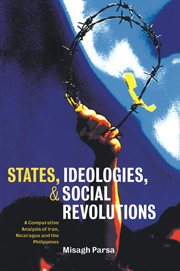 States, Ideologies, and Social Revolutions
States, Ideologies, and Social Revolutions Book contents
- Frontmatter
- Contents
- List of tables
- Preface
- Part I: Theory and structural background
- Part II: Mobilization and collective action
- Prelude
- 4 Students: relentless revolutionaries
- 5 Clergy: actors with relative impunity
- 6 Workers: rebels with dual targets
- 7 Capitalists: reluctant rebels
- Part III: Outcomes and conclusions
- Bibliography
- Index
Prelude
Published online by Cambridge University Press: 22 September 2009
- Frontmatter
- Contents
- List of tables
- Preface
- Part I: Theory and structural background
- Part II: Mobilization and collective action
- Prelude
- 4 Students: relentless revolutionaries
- 5 Clergy: actors with relative impunity
- 6 Workers: rebels with dual targets
- 7 Capitalists: reluctant rebels
- Part III: Outcomes and conclusions
- Bibliography
- Index
Summary
Under highly repressive regimes, social movement actors may mobilize and engage in collective action when opportunities become available. Favorable opportunities for collective action emerge when repression declines or the state becomes vulnerable to challenge and attack. Repressive regimes that are highly dependent on external powers may have to introduce changes and reforms that are recommended or demanded by their more powerful outside supporters. In the context of weak social bases of support, external pressures to liberalize or open up the polity may generate conditions for large-scale insurgency. Furthermore, reduction of external support may render dependent regimes vulnerable to challenge and attack, which may also be a result of economic and political crises among states generally. In times of national polarization, regimes that have weak bases of support may become vulnerable if they resort to repressive measures to intimidate the opposition. Repressive measures against public figures and well-known challengers may render the state vulnerable by generating a coalition among opposition organizations and major segments of the population.
Opportunities, vulnerabilities, and collective action
Given that the Shah's regime was so dependent on outside support, external pressures played an important role in leading the Iranian government to undertake minimal gestures that provided an opportunity for opposition to mobilize. Amnesty International, the International Commission of Jurists, and the UN-affliated International League for Human Rights began to expose the Iranian government's violations of human rights in the mid-1970s.
- Type
- Chapter
- Information
- States, Ideologies, and Social RevolutionsA Comparative Analysis of Iran, Nicaragua, and the Philippines, pp. 89 - 93Publisher: Cambridge University PressPrint publication year: 2000


